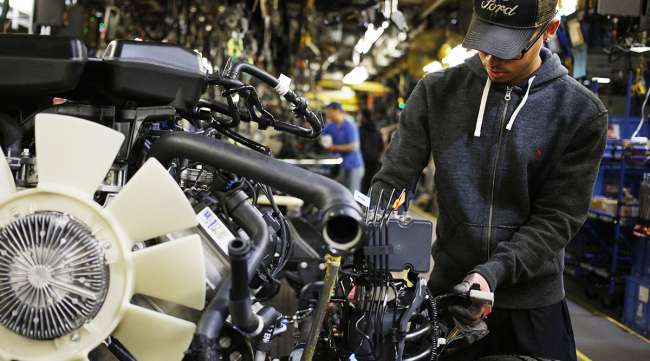EPA Dismisses California’s Emission Compromise With Automakers

[Stay on top of transportation news: Get TTNews in your inbox.]
Four major automakers reached a compromise with California’s clean-air regulator to boost fuel efficiency, a move the Trump administration dismissed as a “PR stunt” that wouldn’t affect its plans to ease mileage requirements enacted during the Obama administration.
The joint agreement with Honda Motor Co., Ford Motor Co., Volkswagen AG and BMW AG amounts to a rebuke of the Trump administration’s 2018 proposal that recommended capping mileage requirements at a 37 mile-per-gallon fleet average starting in 2020, instead of eventually rising to 47 mpg. That plan also proposed stripping California of its authority to regulate carbon emissions from vehicle tailpipes.
The compromise with California gives participating automakers some relief starting in model year 2022 by easing the pace of annual efficiency gains currently required under the California Air Resources Board’s regulations on tailpipe greenhouse gas emissions, and extends the program by one year through 2026. Automakers will also receive additional compliance credits for selling electric vehicles under the plan, among other revisions, the state’s air pollution regulator said.
California, a coalition of states, @Ford @Honda @BMWUSA & @VW are leading the way on smart policies that make the air cleaner and safer for us all.
We call on the rest of the auto industry and the Trump administration to adopt this pragmatic compromise. https://t.co/b3mMctY0ei — Office of the Governor of California (@CAgovernor) July 25, 2019
“The Trump administration is hell bent on rolling them back. They are in complete denialism about climate change,” California’s Democratic Gov. Gavin Newsom told reporters on a media call. “Regardless of what the Trump administration determines in the next few weeks, we are moving forward and we reserve our right to litigate.”
California is in talks with additional automakers that are expected to join the pact as well, Mary Nichols, chairman of the state’s Air Resources Board, said on the call.
In a joint statement, the automakers said the pact with California “will provide our companies much-needed regulatory certainty by allowing us to meet both federal and state requirements with a single national fleet, avoiding a patchwork of regulations while continuing to ensure meaningful greenhouse gas emissions reductions.”
The pact comes as the Environmental Protection Agency and National Highway Traffic Safety Administration are working to finalize their 2018 proposal after discussions with California officials broke down earlier this year.
RELATED: CARB, Four Automakers Reach Deal That Circumvents White House, Sources Say
“Today’s announcement from CARB has no impact on EPA’s regulation of greenhouse gas emissions under the Clean Air Act,” EPA spokesman Michael Abboud said in an email. “This voluntary framework is a PR stunt that does nothing to further the one national standard that will provide certainty and relief for American consumers.”
In the statement, NHTSA said work continues on a final rule with which all companies must comply.
Automakers for months have urged the Trump administration to moderate its rollback, fearing a lengthy legal battle over California’s regulatory powers would throw the critical standards into uncertainty for years. Those efforts have had little sway so far on the White House, which rejected a plea by 17 carmakers last month to work out a compromise with California.
The companies also want to avoid a split market — with federal mileage requirements in most states and more stringent rules in more than a dozen states that adhere to California’s standards. The states that follow California standards account for more than a third of all U.S. auto sales.
The Alliance of Automobile Manufacturers issued a cautious statement stressing the need to avoid litigation with California but also adjusting the Obama-era standards. “Individual companies may have different perspectives on how best to achieve greater certainty,” the alliance said.
In fact, General Motors Co., which did not sign the pact with California, said in a statement, “[Its] focus remains on working with all parties on a solution that would involve a 50-state solution and a national electric vehicle program.”
Tom Pyle, president of the American Energy Alliance, a free-market advocacy group that backs the Trump administration’s plan, said the deal is unlikely to derail the overall direction of the Trump administration’s plan.
“The autos are attempting to put further pressure on their brethren and the Trump administration to negotiate with California. That’s all this is,” Pyle said. “At the end of the day, this deal doesn’t matter because we don’t see a situation where California wins in court.”
Environmentalists cheered the pact.
“It’s a real breakthrough,” said Dan Lashof, director of environmental group World Resources Institute. “I think this is a testament to California’s steadfast determination to make sure we are continuing to make progress on what’s now the biggest source of global warming pollution in the U.S., which is the transportation sector.”




